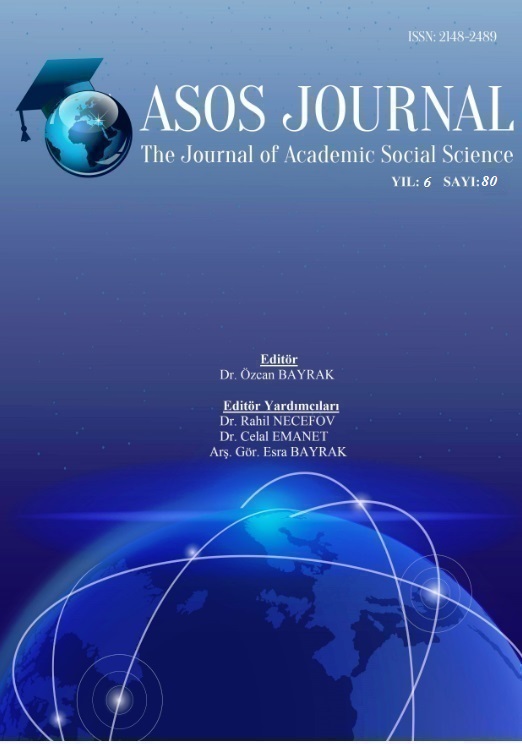KORUMA ALTINDAKİ ÇOCUKLARA YÖNELİK DİNİ MANEVİ REHBERLİK UYGULAMALARI İLE UMUT VE PSİKOLOJİK SAĞLAMLIK İLİŞKİSİ
Author :
Abstract
Bu çalışmanın amacı koruma altındaki çocuk ve ergenlere verilen dini/manevi rehberlik hizmetinin umut ve psikolojik dayanıklılık puanları üzerindeki farklılığının deney ve kontrol grupları üzerinden belirlenmesidir. Bu amaç doğrultusunda Akdeniz Üniversitesi İlahiyat Fakültesi ile o dönemki adı ile Aile ve Sosyal Politikalar Antalya İl Müdürlüğü arasında Mayıs 2017 tarihinde imzalanan protokol çerçevesinde koruma altındaki çocuklara yönelik dini/manevi rehberlik hizmetleri yürütülmektedir. Bu çalışma Eylül 2017- Şubat 2018 arasındaki 24 haftalık süreyi kapsamaktadır. 7-17 yaş arasında 55’i kız, 26’sı erkek toplam 81 çocuk ve ergene Akdeniz Üniversitesi İlahiyat Fakültesi 1., 2. ve 3. sınıf öğrencileri tarafından 24 hafta dini/manevi rehberlik çalışmaları yürütülmüştür. Yine Antalya'daki koruma altındaki çocuklardan dini/manevi rehberlik çalışmaları yapılmayan yaşları 7 ile 17 arasında değişen 64'ü kız 17'si erkek toplam 81 öğrenci de kontrol grubu olarak belirlenmiştir. Araştırmada Arslan (2015) tarafından geliştirilen çocuk ve genç psikolojik sağlamlık ölçeği ile Snyder (1997) tarafından geliştirilen Türkçe'ye Kemer ve Atik tarafından uyarlanan çocuk umut ölçeği kullanılmıştır. Araştırmada elde edilen veriler SPSS (Statistical Package for Social Sciences) for Windows 21.0 programı kullanılarak analiz edilmiştir. Verileri değerlendirilirken tanımlayıcı istatistiksel metotlar (Sayı, Yüzde, Ortalama, Standart sapma) kullanılmıştır. Niceliksel verilerin karşılaştırılmasında iki grup arasındaki fark için T-Testi, kullanılmıştır. Araştırmanın bağımlı ve bağımsız değişkenleri arasındaki ilişkiyi Pearson korelasyon, etki ise regresyon analizi ile test edilmiştir. Elde edilen bulgular %95 güven aralığında %5 anlamlılık düzeyinde değerlendirilmiştir. Çalışmada cinsiyetler arası anlamlı bir farklılık görülmez iken dini/manevi rehberlik çalışmalarının umut ve psikolojik dayanıklılık puanları üzerinde farklılık oluşturup oluşturmadığının belirlemek amacı ile yapılan tanımlayıcı istatistik çalışmasında deney grubundaki katılımcıların hem umut hem de psikolojik dayanıklılık puanlarının daha yüksek olduğu tespit edilmiştir. Ayrıca yapılan T testi sonucunda da deney grubu ve kontrol grubunun umut ve psikolojik dayanıklılık puanları arasındaki farklılığın anlamlı olduğu tespit edilmiştir (P < .05). Koruma altındaki çocuk ve ergenlere yönelik dini/manevi danışmanlık uygulamalarının profesyonel uygulayıcılar tarafından uygulanması ve yaygınlaştırılması faydalı olabilir.
Keywords
Abstract
The objective of this study is to determine, via experimental and control groups, the difference of the religious/spiritual guidance services provided to protected children and adolescents on their hope and psychological resilience scores. Religious/spiritual guidance services are being carried out for protected children and adolescents within the framework of the Protocol entered into by and between Akdeniz University, Faculty of Theology and the Antalya Provincial Directorate of Family and Social Policies (with its name as in that period) on May 2017 for the above-mentioned purpose. This study covers the 24-week period between September 2017 and February 2018. A total of 81 children and adolescents aged 7 to 17 years old, being 55 females and 26 males, were provided with religious and spiritual guidance services by the 1st, 2nd and 3rd grade students of the Faculty of Theology of Akdeniz University. Of protected children in Antalya, a total of 81 children and adolescents aged 7 to 17 years old, being 64 females and 17 males, whom were not provided with religious/spiritual guidance services, were selected as the control group. The psychological resiliency scale for children and adolescents, developed by Arslan (2015), and the children's hope scale, developed by Snyder (1997) and adapted into Turkish by Kemer and Atik, were used in the study. Data obtained in the study were analysed by using SPSS (Statistical Package for Social Sciences) for Windows 21.0. Descriptive statistical methods (number, percentage, mean, standard deviation) were used to evaluate the data. The T-Test was used to compare quantitative data for the differences between the two groups. The relationship between dependent and independent variables of the study was tested by Pearson correlation analysis and the effect was tested by regression analysis. The findings were found to be at a confidence interval of 5% and significance level of 95%. While there was no significant difference between the genders in the study, the descriptive statistics study, performed in order to determine whether the religious/spiritual guidance services made any differences on the hope and psychological resilience scores, revealed that both the hope and psychological resilience scores of the participants in the experimental group were higher. Also, it was determined that the difference between the hope and psychological resilience scores of the participants in the experimental group and the control group was significant (P <.05). It may be useful that religious/spiritual counselling practices for protected children and adolescents be carried out and extended by professional practitioners.





